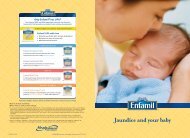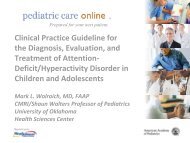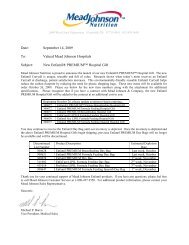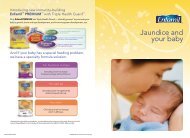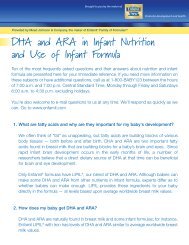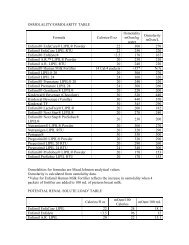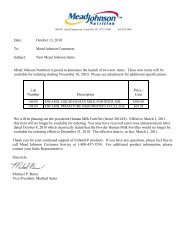LB2882MaternalNutriti+ - Mead Johnson Nutrition
LB2882MaternalNutriti+ - Mead Johnson Nutrition
LB2882MaternalNutriti+ - Mead Johnson Nutrition
Create successful ePaper yourself
Turn your PDF publications into a flip-book with our unique Google optimized e-Paper software.
Women are encouraged to enter pregnancy at a desirable body weight and with good control of chronic medical<br />
conditions, such as diabetes, to help optimize pregnancy outcomes. Once pregnancy is achieved, appropriate<br />
weight gain should be encouraged. In the United States, the IOM has issued detailed recommendations on<br />
pregnancy weight gain that are based on a woman’s pre-pregnancy BMI. Women with pre-pregnancy BMIs indicating<br />
overweight or obesity are encouraged to gain less weight than women with low or normal BMIs. Physical activity is<br />
encouraged for all women except those with specific obstetric and/or medical conditions.<br />
Recommended intakes for energy, protein and carbohydrate increase during pregnancy and lactation.<br />
Recommended intakes for total fat as a percentage of total energy do not change, but the importance of<br />
consuming the fatty acid DHA should be emphasized since it supports a healthy pregnancy and visual and cognitive<br />
development of the infant. The IOM and WHO also recommend higher intakes for several vitamins and minerals<br />
during pregnancy and lactation. It is important for pregnant and lactating women to consume adequate levels of all<br />
essential vitamins and minerals. Folic acid intakes during the first few weeks of pregnancy and iodine intakes during<br />
pregnancy and early infancy are particularly important since deficiencies of these nutrients can have irreversible<br />
negative consequences for an infant. Diet, nutrient, and lifestyle modifications may also prove helpful if pregnancyassociated<br />
conditions arise.<br />
The goal in highlighting these recommendations is to increase familiarity with nutrients and nutrition-related<br />
issues that play important roles in supporting healthy pregnancies and lactation. Eating a safe, balanced diet with<br />
appropriate levels of energy, macronutrients and micronutrients, getting regular physical activity, and avoiding noxious<br />
substances are increasingly recognized at strategies for achieving good pregnancy and lactation outcomes.<br />
29





